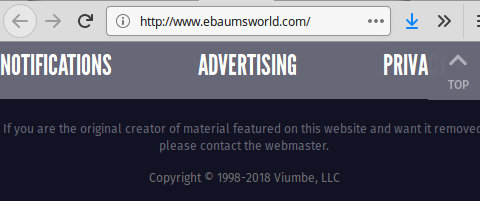Like the blogosphere, meme sites are a legacy of the previous decade that were essentially eclipsed by the big corporate "social" silos. In other words, you could experience the meme on "social" without having to go to an originator, or originating aggregator. So the meme sites lost momentum as destinations. (This wasn't the only reason: add uniform boring corporate redesigns and simple exhaustion of the original target audience.) In any case, it makes sense that these old sites would become "properties" that some Silicontrepeneur would try to squeeze "value" from. For the morbidly inclined, the current landscape is confusing, though.
Here, "eBaum's WORLD" is listed as a portfolio company of Literally media:

What, no funnyjunk or somethingawful?
Clicking the first Literally link takes you to eBaum's WORLD, which shows another company, Viumbe LLC, as owner:

The Viumbe page lists eBaum as a property:

So is Viumbe a Literally subsidiary? Is eBaum in transition between owners with dated website info? Or is Literally the "old" owner? Inquiring meme ghouls want to know.
Update: A reader emailed with some answers!
